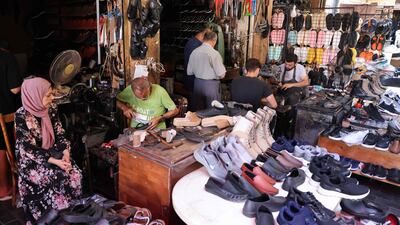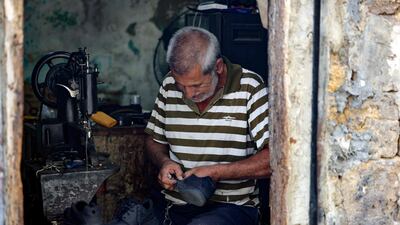Business conditions in Lebanon’s private sector continued to improve for a second consecutive month and hit a 10-year high in July as new orders, employment and business activity drove expansion.
The country's Blom purchasing managers’ index, a measure of the strength of the country’s private sector economy, rose to 50.3 in July from 50.2 in June.
A reading above 50 indicates an expansion in business conditions, while one below represents a contraction.
This is the fastest expansion of Lebanon's private sector economy since June 2013, Blom Bank said.
This comes despite the economic crisis, soaring inflation and a political impasse that has held back billions of dollars from the International Monetary Fund and international donors.
"This momentum is driven by stronger domestic demand and higher employment," said Fadi Osseiran, general manager at Blom Bank.
New orders hit a third-highest reading in more than a decade of PMI survey data and indicated a sustained uplift in new business received by private sector companies, according to the survey. This marked the first time in the PMI survey's history that back-to-back improvements in new orders have been registered.
Employment levels continued to improve in July as businesses raised capacity to meet new orders. The rate of job creation accelerated to its strongest since September 2015.
Despite the increase in employment, Lebanon's private sector businesses registered a further increase in the volume of work backlogs in July due to greater demand. But the rate of backlog accumulation slowed from June, when it reached the quickest since May 2013, according to the survey.
There was also a continued shortening of supplier delivery times in July.
Private sector companies in Lebanon recorded an increase in operating expenses in July due to higher purchase prices. This was attributed to unfavourable exchange rate movements against the US dollar.
Although there was a marked improvement in business confidence in July, companies expressed concerns about the outlook, with continued domestic political and economic uncertainty in the country.
"The outlook for economic activity shows signs of notable improvement, at least for the tourist summer season," Mr Osseiran said.
"We hope that this better outlook is carried over to the long run, underpinned as soon as possible by successful presidential elections, an effective economic reform programme, and last but not least, durable monetary and exchange rate stability."
Lebanon is led by Prime Minister Najib Mikati and a caretaker cabinet. The country needs to elect a new president after the six-year term of Michel Aoun ended at the end of October. However, the election of a new president requires the consensus of the country's political elite, which has failed to come together on key political issues in the recent past.
Inflation in Lebanon hit an annual rate of 260 per cent in May as the political impasse over the election of a president persisted, thwarting the enactment of reforms necessary for the country to emerge from its worst economic crisis.
Hyperinflation continued for the 35th consecutive month as the country's currency lost value on the parallel and official markets after it was devalued by 90 per cent at the start of February.
The country is in the grip of an economic crisis described by the World Bank as one of the worst in modern history and has yet to enforce critical structural and financial reforms required to unlock $3 billion of assistance from the IMF, as well as billions in aid from other international donors.
In June, the IMF said although Lebanon's economy showed some signs of stabilisation in 2022 due to a rebound in tourism, strong inflows of remittances and an improvement in trade in the second half of the year, it "remains severely depressed".
The country's economic outlook "is highly uncertain and depends on the authorities’ policy actions", the Washington-based fund said at the time.
Lebanon's economy contracted by about 58 per cent between 2019 and 2021, with gross domestic product falling to $21.8 billion in 2021, from about $52 billion in 2019, according to the World Bank – the largest contraction on a list of 193 countries.
The World Bank estimates that real GDP declined 2.6 per cent in 2022 and is projected to contract 0.5 per cent this year.










